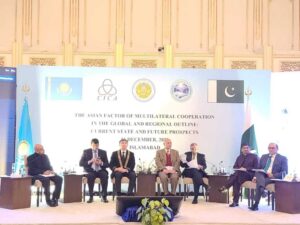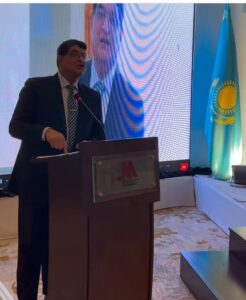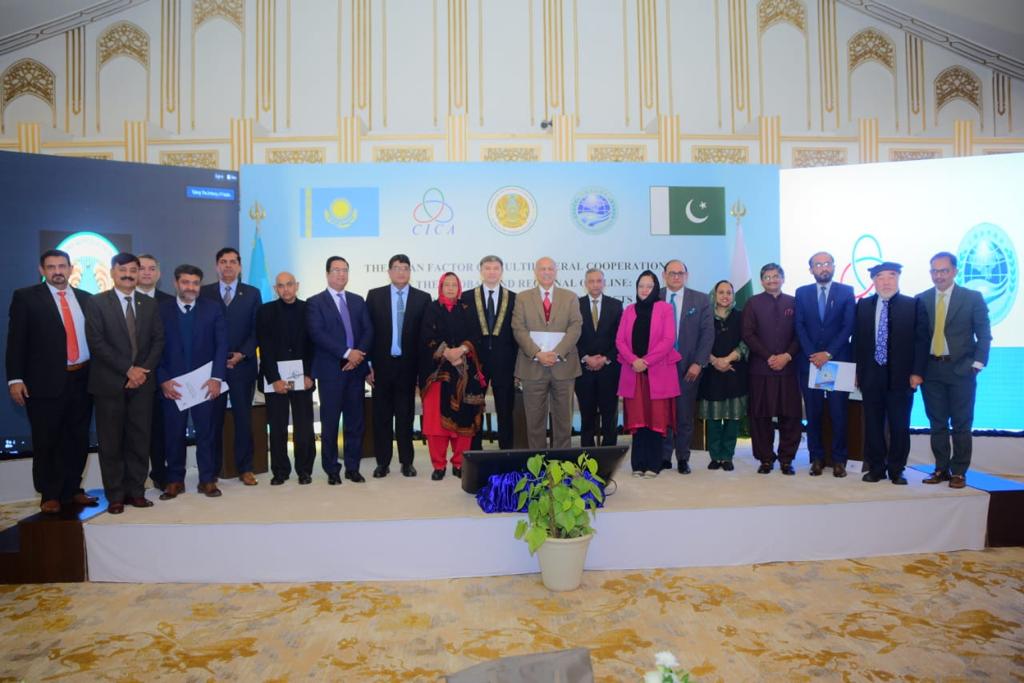
By: Prof. Dr. Muhammad Zia-Ul-Haq
The Conference on Interaction and Confidence Building Measures in Asia (CICA) is a multi-national forum for enhancing cooperation towards promoting peace, security and stability in Asia. It is a forum based on the recognition that there is a close link between peace, security and stability in Asia and in the rest of the world. The Member States, while affirming their commitment to the UN Charter, believe that peace and security in Asia can be achieved through dialogue and cooperation leading to a common indivisible area of security in Asia where all states co-exist peacefully and their peoples live in peace, freedom and prosperity. 
The idea of convening CICA was first proposed by the First President of the Republic of Kazakhstan – Elbasy H.E. Mr. Nursultan Nazarbayev, on 5 October 1992, at the 47th Session of the United Nations General Assembly. The moving spirit behind this initiative was the aspiration to set up an efficient and acceptable structure for ensuring peace and security in Asia. Unlike other regions in the world, Asia did not have such a structure at the time and earlier attempts to create a suitable structure had not been very successful. This initiative was supported by a number of Asian countries who felt that such a structure was the need of the time.
Economic Dimensions
Environmental Dimension
Human Dimension
New Challenges and Threats and Dimensions
Military and political dimensions
According to the updated CICA Catalogue, Member States have specified the following priorities for cooperation in human dimension:
Promotion of dialogue among civilizations, cultures and religions; while taking into considerationthe views and recommendations stated in the report of the UN High Level Group of “Alliance of Civilizations” on November 13th, 2006.
This paper demonstrates that dialogue, in its widely accepted meaning of conversation between the followers of different religious traditions for the purpose of understanding, is necessary for human beings. Not only the manifestation of divine wisdom but also the shrinkage of world into a global village requires setting up rules for mutual understanding between the people of different faiths. Due to the pluralistic nature of Islam, Muslims have no theological restrictions for engaging in dialogue. The Islamic doctrine of interfaith dialogue is based on its recognition and acknowledgement of truth in other religions. Islam values the righteous works of the followers of other religions and never claims that salvation is restricted to that faith only. The basic tenets of Islam declare that humankind was a single community that was later split into various communities in accordance with divine plan, and Muslims are one of them. The Islamic concept Ahl al-Kītāb not only provides framework of interfaith interaction with Christians and Jews explicitly but implicitly extends to all religious communities. The commandments of Islamic Law and theology facilitate a frank, sincere and constructive dialogue between communities and faiths. It shows that the activity of dialogue for the purpose of resolving conflicts and endurance of harmony and peace in this world is inevitable. The careful and close study of Islamic sources enforces the idea of respect for differences and appreciation of cultural diversity. It demonstrates that pluralism is a source of strength for humanity and not cause for division and hatred.
In spite of the dialogical nature of Islam, Muslims, on the whole, have failed to engage in dialogue. Their hesitation in active contribution into dialogue is rooted in socioeconomic and political misunderstandings and problems. The ‘bludgeon-Islam-out-of-existence’ school of thought in the West and extremists and exclusivists in Muslim societies are trying to hijack the relations between Muslims and others, particularly the West. The events such as 9/11 have illustrated that in presence of trust deficits, historical notions, phobias, conspiracy theories and hatred, a few individuals can cause confrontation between civilizations with their actions. The differences between Muslims and the West do take religious dimensions sometimes, but in reality, it is not a clash between Islam and the West; it is between extremists and exclusivists of both sides with pluralists of both sides. This study proves that killing of innocent people in the name of religion has nothing to do with Islamic theology; however, the causes and consequences of the actions of individuals brought religions and civilizations into dispute.

Global dialogue at every level is the best way of preventing extremists from hijacking Islam or any other religion as an innocent victim. Muslims in particular have a duty to share with the world the practical spiritual wisdom that they have inherited, instead of allowing misconceptions to generate a ‘‘them and us’’ mentality that is already leading to a polarization of the world. They also need to be reciprocal to the positive steps of the other communities, such as Nostra Aetate. In present circumstances, dialogue will be more fruitful and beneficial for the Muslims; therefore, their active participation in it is obligatory as it is in the opinion of famous classical scholars such as Ibn Hajar Asklānī and Ibn Qayyim Al-Jawziyya.
It is necessary that, as part of their long-term policy, Muslims must try to solve the challenges that are creating impediments in their active participation in interfaith dialogue. As short-term measures, they have to prepare seriously for dialogue with creation of agreed upon authority. This kind of authority can be possible under the umbrella of the Organization of Islamic Conference (OIC), which is in fact principally already agreed on it, but practically nothing has been done. The history of dialogue witnesses that usually Muslims participated in dialogue as invited guests and the invitees selected their representatives. This creates a mistrust of majority of Muslims in dialogue. To restore confidence of the main stream Muslims, it will be appropriate if Muslim countries, organizations and universities not only academically search areas and means of dialogue but also arrange dialogue and participate in it, not as guests, but as hosts. It is also recommended that Muslims enter into internal dialogue along with participation in dialogue with others. This kind of dialogue will provide them an opportunity of self-criticism and preparation. It will streamline their strategies in dialogue and be helpful to them in solving the crises of representation. The dialogue between Muslims and others is usually limited to dialogue between Muslims and Christians, or sometimes with Jews. Dialogue between Muslims and Eastern civilizations, like Hindus, Baddish, Chinese and Japanese, are also the need of the present scenario.
The present developments in science and technology require parallel progress in the relationship of followers of different religious and cultural traditions. The time has affirmed the continuous need for joint efforts by all major civilizations to promote a culture of dialogue on the basis of difference, diversity, plurality tolerance, mutual respect, freedom of expression and sincere readiness at the grass root level. Agreement on the agenda on the basis of common interests like spiritual satisfaction, trans-cultural norms, justice and submission to the creature of the universe will lead dialogue to succeed. The dialogue is the only hope for saving the world from clash of civilizations; otherwise, worldwide conflicts and violence will continue taking religious dimension after feeding from misconceptions, misunderstandings and misrepresentations. Confidence of human beings on the movement of dialogue will push us ahead and we will be able to talk on other matters that are important to all nations, such as ecology, holy places, medical ethics, food technology, etc. Worldwide efforts against hunger, disease and natural disasters can be unified only after a better understanding and harmony among the faiths through dialogue.
( Author is: Director General at Islamic Research Institute, Professor of Shahria and Islamic Law, International Islamic University, Islamabad. He can be reached: [email protected])


